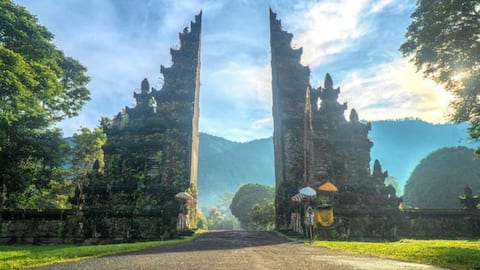Bali's building law protects the island's natural aesthetics
What's the story
Bali, a popular tourist destination known for its lush landscapes and azure waters, has a unique building legislation to preserve its natural beauty. The Bali Province Regional Regulation (Perda) No. 16 of 2009 mandates that no building can exceed the height of a coconut tree or 15 meters. This law, which is deeply rooted in traditional customs, has been effective since 2009 and is part of the Bali Province Regional Spatial Planning Plan for 2009-2029.
Cultural influence
Exceptions and influences behind the building legislation
The legislation, while strict, does allow for exceptions in cases of public and special buildings that require a height of more than 15 meters. These include towers transmitters, high voltage electricity poles, lighthouses, religious building towers, aviation safety buildings, and defense and security structures. The law is deeply influenced by the ancient principles of Balinese Hinduism known as Tri Hatha Karana which emphasizes harmony between humans, nature, and the spiritual world.
Building restrictions
Legislation's impact on architecture and tourism development
The Tri Hatha Karana principle not only encourages harmony but also guides architectural and tourism development in Bali. It discourages buildings from dominating the landscape, promoting integration within the natural environment instead. Despite being legislated since 2009, some hotels and resorts exceed the 15m limit. However, new constructions must adhere to this restriction unless granted specific permission from relevant authorities.
Future developments
Bali's new era: Balancing tourism and preservation
As Bali enters its New Era, Governor Koster and other political leaders are emphasizing the preservation and promotion of the island's cultural and natural landscapes. With increasing tourism demand and the government's desire for more international investment, more resorts, hotels, and tourism developments are expected to be constructed. However, concerns about the impact of such developments on the island's natural beauty and cultural heritage are being raised.
Public opposition
Community resistance to large resort development
Recently, a community in Seseh, an emerging tourist destination near Canggu, petitioned against a large resort development planned for the beachfront. The petition gained significant online support and attention on social media. As a result of this public opposition, the international investment group behind the project has decided to put it on hold for the foreseeable future.
